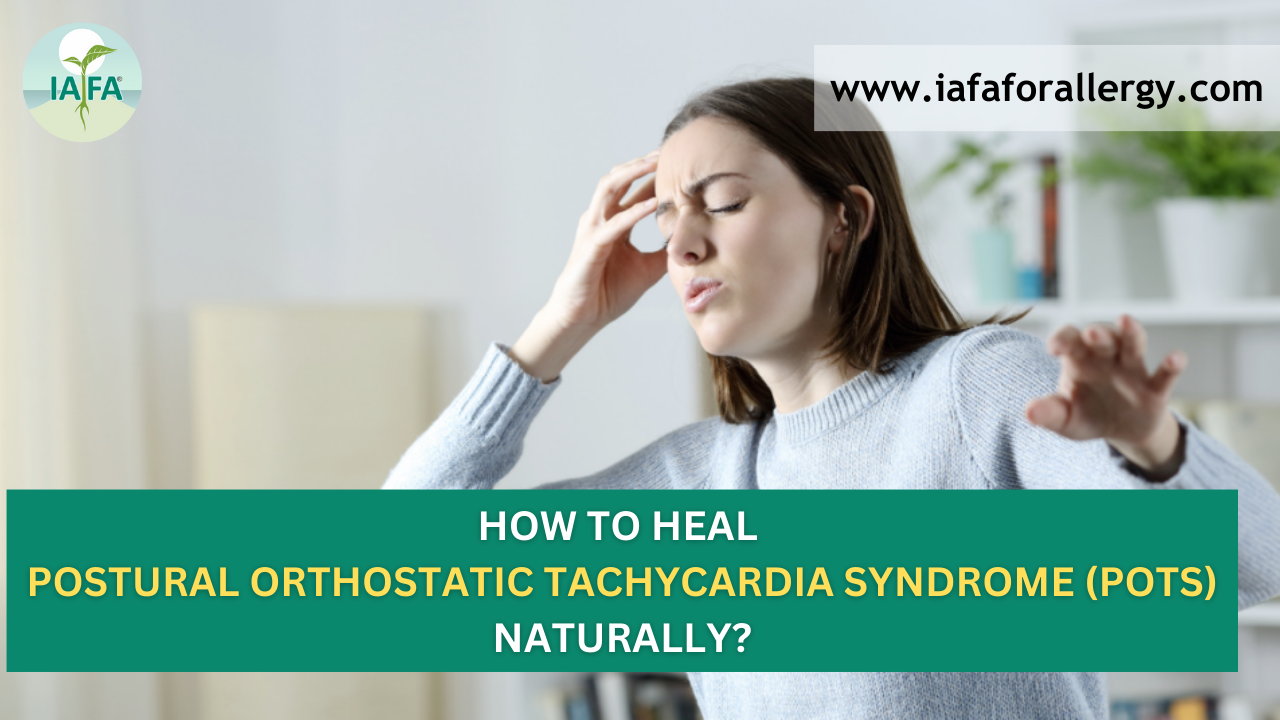A Brief About the Disease
Postural Orthostatic tachycardia syndrome (POTS) is a condition where you experience a wide range of symptoms when you stand up from lying down. It varies from person to person and the symptoms too, but in general symptoms like dizziness, fainting, increased heart rate, lightheadedness, heart palpitations, fatigue, shakiness, shortness of breath, and chest pain can be observed. Today through this blog, we will let you know how we can heal Postural Orthostatic Tachycardia Syndrome (POTS) naturally.
How Do I Get Postural Orthostatic Tachycardia Syndrome (POTS)?
When you suddenly Stand up after lying down, because of gravity, 10-15% of your blood settles in your abdomen, legs, and arms leaving less blood transported to your brain and heart. That’s why you may experience symptoms related to your heart and brain.
To compensate for the low blood supply to the heart, your autonomic nervous system sends a series of responses and hormones like epinephrine and norepinephrine. These hormones cause faster heart beats, blood vessels to tighten or constrict.
Is Postural Orthostatic Tachycardia Syndrome (POTS) Serious?
Although the days to stay can be serious in some people, it’s not a life-threatening condition in many. To say, there is a belief that it can affect day-to-day life activities but Ayurvedic Treatment of POTS can help you heal naturally.
Causes of Postural Orthostatic Tachycardia Syndrome (POTS)
The exact cause of POTS is unknown but there are certain reasons for the occurrence of the disease.
- Major surgery
- Trauma
- Pregnancy
- Viral illness
- Menstrual cramps
- Resting too much
- Not drinking enough water or fluids
- Drinking more alcohol
- COVID-19 (some reports have shown that people who have been attacked by COVID-19 experience the symptoms of POTS).
Both POTS and COVID-19 are the Same?
The simple answer is no, even though both COVID-19 and POTS patients experience similar symptoms like fainting, heart palpitations, increased heart rate and altered blood pressure, lightheadedness, and dizziness but the symptoms in COVID-19 patients are severe.
How Can I Cure POTS Naturally?
Physical activity, exercise, diet and nutrition, managing your sleep schedule, and incorporating more herbs and herbal remedies can help you cure POTS naturally.
Ayurvedic Treatment of Postural Orthostatic Tachycardia Syndrome (POTS)
General Guidance to Follow in Case of POTS:-
- Increase Fluid and Salt Intake: Staying well-hydrated and increasing your salt intake may help improve blood volume and blood pressure regulation. Be sure to consult with your doctor to determine the appropriate amount of fluid and salt intake for your condition.
- Exercise and Physical Therapy: Gradual, low-impact exercises and physical therapy can be beneficial for improving cardiovascular fitness, muscle strength, and overall circulation. Exercise should be tailored to your abilities and may include activities like walking, swimming, or stationary cycling.
- Compression Garments: Wearing compression stockings or abdominal binders can help improve blood circulation and reduce symptoms of lightheadedness and dizziness.
- Elevate the Head of Your Bed: Sleeping with the head of your bed elevated may help reduce symptoms during the night and improve blood flow to the brain.
- Avoid Triggers: Identify and avoid triggers that worsen your symptoms, such as hot weather, certain foods, or standing for extended periods.
- Manage Stress: Stress can exacerbate POTS symptoms. Incorporate stress-reduction techniques like meditation, deep breathing exercises, yoga, or mindfulness practices into your daily routine.
- Maintain a Balanced Diet: Eating a nutritious diet that includes a variety of whole foods, fruits, vegetables, and lean proteins can support overall health and well-being.
- Adequate Rest and Sleep: Make sure you are getting enough rest and quality sleep each night to support your body’s recovery and overall function.
- Herbal Supplements: Herbs are a crucial part of treating the root cause of the disease and help you to build a healthy life without any adverse effects. Similarly, potential herbs that boost your immunity and strengthen your heart mucus play a key role in getting rid of POTS completely.
- Biofeedback and Relaxation Techniques: Biofeedback and relaxation training can help you gain better control over your body’s responses and reduce symptoms.
Also Read:- How to Prevent Postural Orthostatic Tachycardia Syndrome (POTS) Holistically?
Herbs that Can Help in the Treatment of POTS
Certain herbs can help to support the cardiovascular system, improve circulation, and balance the autonomic nervous system. Examples include:-
- Ashwagandha (Withania somnifera)
- Brahmi (Bacopa monnieri)
- Arjuna (Terminalia arjuna)
- Guduchi (Tinospora cordifolia)
Herbal Remedies for POTS by IAFA Ayurveda
These herbal remedies along with treating symptoms like lightheadedness, headache, dizziness, and heart palpitations, also boost the blood supply to the heart and brain, strengthen cardiac muscle, and improve overall heart health.
Panchakarma Therapies for POTS
Panchakarma is a set of therapeutic procedures in Ayurveda that aim to detoxify the body, balance the doshas (energetic forces), and improve overall health. Panchakarma therapies such as Abhyanga (Ayurvedic massage), Shirodhara (Continuous pouring of warm oil on the forehead), and Nasya (Instilling nasal drops) may be beneficial in managing symptoms of POTS by reducing stress, improving circulation, and enhancing relaxation.
Dietary Modifications
Ayurveda emphasizes the importance of a balanced diet to maintain overall health. The diet may include easily digestible foods, warm and nourishing meals, and avoiding excessive intake of processed foods, caffeine, and alcohol. Foods that improve cardiac health and are rich in calcium, vitamin D, and other minerals like sodium, zinc, and potassium.
Yoga and Pranayama
Ayurveda recognizes the mind-body connection and the importance of managing stress in maintaining good health. Yoga postures, gentle stretching, and specific breathing techniques (Pranayama) can help calm the mind, balance the nervous system, and improve overall well-being. Yoga asanas help in aligning the heart, and brain in harmony, and gentle exercises like brisk walking, running, and cardio help in improving your body’s strength.
Lifestyle Modifications
Ayurveda promotes a balanced lifestyle that includes adequate rest, regular exercise suitable for the individual’s condition, and maintaining a daily routine that supports overall health. Proper sleep hygiene, stress management techniques, and maintaining a balanced work-life routine are also important aspects to consider for the Natural Treatment of POTS.
The Bottom Line
POTS is not a serious condition to be worried about, gentle care and a good hygiene routine help in healing POTS naturally. It is always recommended that before using or following any natural remedies, Ayurvedic remedies, diet, and lifestyle guidance, must consult with an Ayurvedic physician. You can also book an online consultation with Dr. Sahil Gupta (Founder of IAFA Ayurveda) for the natural treatment of various health concerns.








